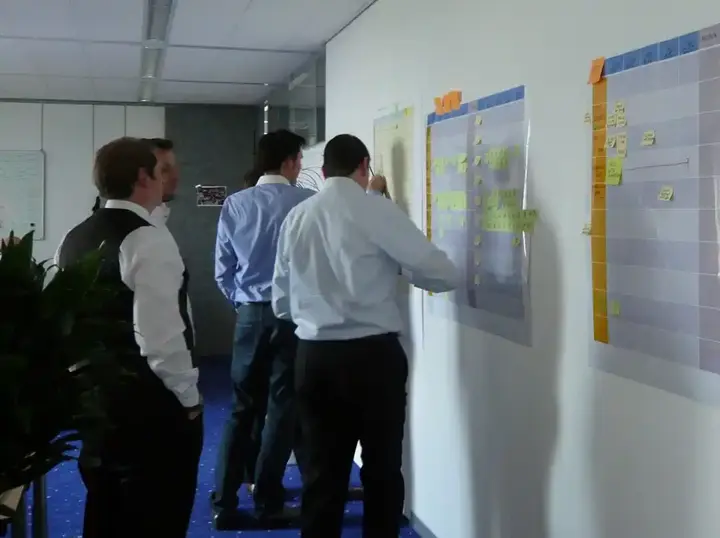Success Guide - How to learn the skill of planning?
If you ever feel that many things in your life are volatile, and a bit of chaos that hinders you a lot from achievement. Then you desperately need to learn the skill of planning.
You should not worry; most do not have such a skill innately. But it is a skill that must be learned, and it is developed even with those who possess it naturally.
Through the following lines, we will try to list simplified and practical steps to reach mastery of this skill. Knowing that it is a skill that only comes with actual practice.
Remember that planning is a scalable skill. With practice and patience, you will be able to master it and achieve your goals.
Planning skills can be considered one of the basic skills that help you achieve your goals and accomplish your tasks efficiently and effectively, whether in your personal or professional life.
Recommend
Steps to learn the skill of planning

1. Set your goals: You first have to sit down with yourself, only you can set your goals. Start by clearly defining your goals, whether they are short-term or long-term goals. Make sure your goals are specific, measurable, achievable, relevant, and time-bound (SMART).
2. Break down your goals into smaller steps: Once you've defined your goals, break them down into smaller, more manageable steps. This will help you feel accomplished as you progress, and make it easier for you to follow your course of action.
3. Set priorities: You should know that not every step of your steps is equally important. Prioritize tasks based on their importance and urgency.
4. Set a schedule: Set a specific time for each of your tasks. Make sure your schedule is realistic and achievable.
5. Use planning tools: There are many planning tools available, such as calendars, task schedules, and planning apps. Choose the tools that suit your needs and style.
6. . Be flexible: Don't expect things to always go according to your plans. Be prepared for adjustments and changes as needed.
7. Monitor your progress: Make time to review your progress regularly. This will help you determine what is going well and what needs improvement.
8. Reward yourself: Reward yourself for your achievements. This will help you stay motivated and keep working hard.
Advice consequential operation

• Start with small and easy projects.
Over time, you'll be able to handle larger, more complex projects.
• Don't be afraid to ask others for help.
Friends, family and colleagues can provide you with support and guidance.
• Read books and articles about planning skills.
• There are many resources available to help you learn this skill.
• Practice planning skills regularly.
• The more you use it, the better you will become.
You must remember that planning is a really sought-after skill, especially in the labor market, both at the executive elementary level, and even at the administrative advanced. Learning the skill of planning is a valuable investment in yourself and your future. Let's highlight the most important benefits you will get from this important skill...
These are just some of the most important benefits of planning skill. By learning this skill, you can dramatically improve your life in all its aspects.
Benefits of Planning Skill
1. Achieving goals: Planning helps you clearly define your goals and break them down into achievable steps. It also gives you a specific action plan to reach your goals. It increases your chances of achieving your goals effectively.
2. Improve productivity: Planning helps you organize and use your time efficiently. Reduces procrastination and procrastination. It increases your ability to accomplish more tasks in less time.
3. Reduce stress: Planning helps you feel more in control of your life. Reduces feelings of anxiety and stress. Increases your ability to cope with stressors.
4. Improve focus: Planning helps you set your priorities and focus on the most important tasks. Reduces distraction and preoccupation with unimportant tasks. Increases your ability to focus on one task at a time.
5. Boost self-confidence: Planning helps you achieve your goals, boosting your self-confidence and abilities. It makes you feel accomplished and happy. Increases your ability to make decisions with confidence.
6. Improve relationships: Planning helps you fulfill your obligations to others. Reduces misunderstandings and conflicts. Increases your ability to build strong relationships with others.
7. Improve health: Planning helps you eat a healthy diet and exercise regularly. Reduces stress and anxiety. Increases your ability to get enough sleep.
8. Save money: By planning your budget and spending your money wisely.
9. Improve problem-solving skills: by analyzing problems and identifying appropriate solutions.
10. Foster creativity: by thinking outside the box and generating new ideas.
![]()
Unexplained phenomena - a list that drives you crazy!
Marfa lights, glowing mysteriously in Texas deserts, and intricate crop circles bent into fields with no clear cause, both baffle scientists and spark theories from the natural to the supernatural. The Bermuda Triangle, too, remains a hotspot of intrigue, with ships and planes vanishing, leaving only questions and fascination behind. more- ADVERTISEMENT
![]()
5 things you should remember when you don't believe in yourself
5 Things to Remember When You Don’t Believe in Yourself more- ADVERTISEMENT
![]()
The most famous data leaks in history - a list of wonders!
Big names get hacked too—Yahoo, LinkedIn, Facebook, and Canva all suffered massive data breaches, exposing millions of users’ info. These attacks didn’t just hurt reputations—they shook global cybersecurity and pushed companies to step up protection, while users were urged to change passwords and enable two-factor authentication. more- ADVERTISEMENT
![]()
Time travel through remote Lewis Island in Scotland
Time Travel Through Scotland’s Remote Isle of Lewis more- ADVERTISEMENT
![]()
The Sahara Dilemma: Are Deserts Vital to the Balance of Our Planet?
Deserts may seem lifeless and harsh, but they’re vital to our planet. They store carbon, support unique species, and even help nourish the Amazon Rainforest. Despite their importance, human activities threaten these fragile ecosystems. So yes—deserts matter, and we need them more than we think. more- ADVERTISEMENT
![]()
3 undeniable signs that you are on the right path
When fear grips you, isolation surrounds you, and strange coincidences start to appear—don’t worry. These are signs you’re on the right path. Embrace the journey, trust your growth, and remember: returning to your true self is the most magical part of it all. more- ADVERTISEMENT
![]()
Blood test uses 'protein clock' to predict risk of Alzheimer's disease and other diseases
Blood test uses 'protein clock' to predict risk of Alzheimer's disease in others more- ADVERTISEMENT
![]()
Why is um Kulthum known as Our Lady of Egypt?
Oum Kulthum, known as the "Voice of Egypt" and the "Star of the East," captivated millions with her powerful voice and poetic songs. For decades, her live radio concerts united the Arab world, and her legacy still echoes in Egyptian identity and culture. more- ADVERTISEMENT
![]()
The four highest capitals in the world are located in Latin America, what are they?
Many Latin American capitals sit high in the mountains for reasons like cooler climates, better defense from pirates, and historical ties to indigenous sites. Cities like La Paz, Quito, and Bogotá remain notable for their altitude, beauty, and strategic importance since colonial times. more- ADVERTISEMENT
![]()
The most important technical terms that everyone should know
Knowing technical terms isn’t always necessary—but if you want to dive deeper into tech or work in the field, it’s essential. Technologies like AI, IoT, VR, and 3D printing are transforming daily life, industry, and healthcare, bringing both exciting possibilities and challenges like privacy and security. more- ADVERTISEMENT





















